Books
Immigration
 After over two years of looking at and analyzing immigration chiefly in the United States, FG has written Becoming American: Why Immigration is Good for Our Nation’s Future. The book,which was released on March 6, 2014, comes at a time when the issue of immigration has been at the forefront of much heated debate. As an immigrant himself, the topic is extremely close to FG’s heart. So, when writing his book, FG made sure to take a unique approach — one that weaves statistics, research, and theory with personal narratives and case studies. Through its publication, FG hopes to dispel a number of misconceptions about immigration and to put faces on the statistics in order to avoid falling back into knee-jerk positions based on ignorance, fear, and racism.
After over two years of looking at and analyzing immigration chiefly in the United States, FG has written Becoming American: Why Immigration is Good for Our Nation’s Future. The book,which was released on March 6, 2014, comes at a time when the issue of immigration has been at the forefront of much heated debate. As an immigrant himself, the topic is extremely close to FG’s heart. So, when writing his book, FG made sure to take a unique approach — one that weaves statistics, research, and theory with personal narratives and case studies. Through its publication, FG hopes to dispel a number of misconceptions about immigration and to put faces on the statistics in order to avoid falling back into knee-jerk positions based on ignorance, fear, and racism.
See Book
 Global Tectonics: What Every Business Needs to Know
Global Tectonics: What Every Business Needs to Know
Presently, FG is working on updating his book Global Tectonics: What Every Business Needs to Know, with relevant data forecasting out to 2050. Its publication will mark a decade since the release of the original book, which predicted the business arena out to 2025. With this new edition, the 12 global trends initially identified — such as shifts in population, changes in governance, and the rise of biotechnology — will be updated to reflect the current situation so that business leaders can better prepare for the future.
See full description

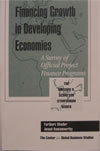 Financing Growth in Developing Economies
Financing Growth in Developing Economies
Finance agencies in countries belonging to the Organization for Economic Cooperation and Development (OECD) provide an important stimulus to economic development. The services of these agencies are valuable to businesses in OECD nations wishing to penetrate overseas markets, to businesses in developing nations seeking capital, and to governments in developing countries. This book surveys and compares 11 such agencies.See full description
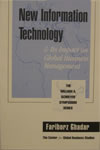 New Information Technology & Its Impact on Global Business Management
New Information Technology & Its Impact on Global Business Management
More than 70 distinguished leaders from business and academia came together to discuss how information technology is dramatically changing the landscape of conducting business and to explore relevant solutions to the challenges ahead.See full description
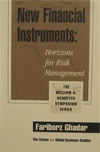 New Financial Instruments: Horizons for Risk Management
New Financial Instruments: Horizons for Risk Management
We have identified twelve global trends that will present the most formidable challenges to world business leaders in the next thirty years. Developments in areas such as demography, infectious disease, resource degradation, economic integration, nano and information technologies, international conflict, and governance will determine corporate strategy. Whether these tectonic shifts put industries through minor tremors or major earthquakes will depend on how businesses have prepared for imminent change.See full description
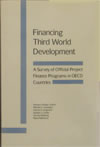 Financing Third World Development: A Survey of Official Project Finance Programs OECD Countries
Financing Third World Development: A Survey of Official Project Finance Programs OECD Countries
Project finance agencies in countries belonging to the Organization for Economic Cooperation and Development (OECD) provide an important stimulus to economic development in the Third World. The services of these agencies are valuable to businessmen in OECD nations wishing to penetrate overseas markets, to business leaders in developing nations seeking capital, and to governments in developing countries. This book surveys and compares eight such agencies.See full description
 U.S Industrial Competitiveness: The Case of the Textile and Apparel Industry
U.S Industrial Competitiveness: The Case of the Textile and Apparel Industry
This book examines the global and domestic forces that have affected the performance of the U.S manufacturing sector. These forces are complex in nature, and many were unimagined 20 years ago. The corporate and governmental responses to these developments are examined and recommendations for increasing the competitiveness of U.S industry are discussed. See full description
 The Multinational Enterprise in Transition
The Multinational Enterprise in Transition
The Multinational Enterprise has probably had the greatest impact on the flow of goods and services in world trade of any international institution during the past three decades. One of the most significant changes in international economic institutions during the past three decades has been the emergence of the multinational enterprise. Policy formulation has not yet caught up with this change.See full description
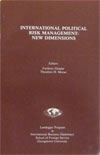 International Political Risk Management: New Dimensions
International Political Risk Management: New Dimensions
This volume focuses on:- The assessment of political risk
- The delineation of management tools and techniques to deal with political risk
- The development of corporate strategies to operate in environments in which political risk is endemic.
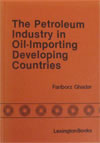 The Petroleum Industry in Oil-Importing Developing Countries
The Petroleum Industry in Oil-Importing Developing Countries
This book is a study of the development and growth of the petroleum industry in oil-importing developing countries (OIDCs). Three such countries – Argentina, India, and Korea-were selected as a diverse yet representative sample and were examined using an intensive case-study method.See full description
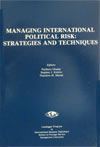 Managing International Political Risk: Strategies and Techniques
Managing International Political Risk: Strategies and Techniques
The initial focus of international political risk studies in the period 1979-82 centered on assessment techniques and the forecasting of unfavorable events in an increasingly turbulent world. This book represents the second wave of analysis, the Management of Political Risk as a part of corporate planning and corporate strategy. This is one of the most important, and most difficult, tasks facing international business managers today.See full description
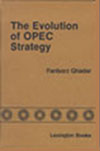 The Evolution of OPEC Strategy
The Evolution of OPEC Strategy
The development and growth of national oil companies (NOCs) in developing oil-exporting nations is studied in this book. From three intensive case studies of Iran, Saudi Arabia, and Indonesia, it is concluded that similarities exist in the development of these national oil companies that make it appropriate to describe and categorize their historical growth by using three stages of development.See full description
Financing Growth

Finance agencies in countries belonging to the Organization for Economic Cooperation and Development (OECD) provide an important stimulus to economic development. The services of these agencies are valuable to businesses in OECD nations wishing to penetrate overseas markets, to businesses in developing nations seeking capital, and to governments in developing countries. This book surveys and compares 11 such agencies. Because these agencies operate under their own separate mandates, they differ in many of their objectives and in how they provide development finance. However, these agencies also share many goals and practices and, viewed together, offer an impressive array of resources. By comparing the specific characteristics of the agencies, the book is a valuable tool for companies seeking investment assistance as well as governments hoping to attract foreign investment.
Global Tectonics

Worldwide, CEOs and senior managers need to prepare their industries for Global Tectonics–the process by which developing trends in technology, nature, and society slowly revolutionize the business environment of the future. Much like the earth’s tectonic plates, global trends shift unnoticed as they transform our industrial and societal topography. Business executives easily and often overlook such gradual developments — that is until a major quake shakes their corporate foundations. We have identified twelve global trends that will present the most formidable challenges to world business leaders in the next thirty years. Developments in areas such as demography, infectious disease, resource degradation, economic integration, nano and information technologies, international conflict, and governance will determine corporate strategy. Whether these tectonic shifts put industries through minor tremors or major earthquakes will depend on how businesses have prepared for imminent change. Corporations have both the ability and the responsibility to foresee, to understand, and to adjust to these trends as they unfold. We categorize tectonic shifts as societal, technological, and environmental. One set of global trends arises from the interactions of people with their environment. The global population is growing, cities are burgeoning, and these demographic changes impact resource management, health, and the quality of life for people and businesses around the world. Technology, another tectonic driver, powers economic growth and development. Advances in biotechnology, nanotechnology, and information systems have enhanced global economic integration, fueling what we now term the ‘knowledge economy’. A third set of trends describes shifts within the international system and civil society. The end of the Cold War sparked a new wave of democratization, economic integration, and governance that continues to transform the fundamentals of international business. Many of these trends overlap in both degree and direction, often compounding their impact on industry. For instance, the availability of land, labor, and critical inputs such as energy, depends on trends in population growth, biotechnology, urbanization, and natural resource management. We also observe that the growth of the knowledge economy and enhanced economic integration have risen mainly from developments in the field of information technology. Given the interconnectivity and synergy between such trends, business leaders must interpret tectonic shifts on a case-by-case basis. Every business, regardless of its size or industry, must view day-to-day operations in light of these global developments. Our report and presentations facilitate this type of analysis by clearly outlining global trends and their potential impact on international business. The evolution of global tectonics will be pivotal in CEOs’ decision-making processes, now and decades into the future.
New Information Technology & Its Impact on Global Business Management

The Penn State Center for Global Business Studies hosted the second William A. Schreyer Symposium entitled “New Information Technology and Its Impact on Global Business Management.” The symposium, held in New York City, attracted media from the Associated Press, Dow Jones, Fortune, Reuters, The WallStreet Journal, CNBC and MSNBC. More than 70 distinguished leaders from business and academia came together to discuss how information technology is dramatically changing the landscape of conducting business and to explore relevant solutions to the challenges ahead. Featured speakers included William A. Schreyer, chairman emeritus of Merrill Lynch & Co., Inc.; Alfred R. Berkeley, III, president of NASDAQ; Earnest W. Deavenport, Jr., chairman and CEO of Eastman Chemical Company; and several CIOs of Fortune 100 companies.
New Financial Instruments: Horizons for Risk Management

“New Financial Instruments: Horizons for Risk Management” was the inaugural symposium in the William A. Schreyer Symposium Series held September 28 and 29, 1995, on Penn State’s University Park Campus. The symposium covered the impact of the new financial instruments on the risk management operations of corporations and financial institutions around the world, while highlighting their effect on world markets and reviewing the need for corporate regulation.
Financing Third World Development: A Survey of Official Project Finance Programs OECD Countries

Project finance agencies in countries belonging to the Organization for Economic Cooperation and Development (OECD) provide an important stimulus to economic development in the Third World. The services of these agencies are valuable to businessmen in OECD nations wishing to penetrate overseas markets, to business leaders in developing nations seeking capital, and to governments in developing countries. This book surveys and compares eight such agencies:
Central Fund for Economic Cooperation ( France ), Commonwealth Development Cooperation( UK ),European Investment Bank (European Community), German Company for Economic Cooperation, Netherlands Finance Company for Developing Countries, Overseas Economic Cooperation Fund and Export-Import Bank of Japan, Overseas Private Investment Cooperation (United States).
Because the agencies operate under their own separate mandates, they differ in many of their objectives and in how they provide development finance. But they also share many goals and practices and, viewed together, offer an impressive array of resources. By comparing the specific characteristics of the agencies, the book will be a valuable tool for companies seeking investment assistance as well as governments hoping to attract foreign investment.
U.S Industrial Competitiveness: The Case of the Textile and Apparel Industry

This book examines the global and domestic forces that have affected the performance of the U.S manufacturing sector. These forces are complex in nature, and many were unimagined 20 years ago. The corporate and governmental responses to these developments are examined and recommendations for increasing the competitiveness of U.S industry are discussed. The book is an account, based on statistical evidence and firsthand consultation, of the evolution of the present crisis in competitiveness and a description of the solutions that have been advanced to address it.
The Multinational Enterprise in Transition

The Multinational Enterprise has probably had the greatest impact on the flow of goods and services in world trade of any international institution during the past three decades. One of the most significant changes in international economic institutions during the past three decades has been the emergence of the multinational enterprise. Policy formulation has not yet caught up with this change. Government officials and corporate executives alike are attempting to cope with this continuing phenomenon and to formulate appropriate guidelines for policy coordination and control. This book provides the business executive, government official, scholar and student with a better understanding of the changing context in which business is conducted on a global basis. Forty-one leading observers of multinational enterprises have contributed to this book. Particular emphasis has been placed on creating an awareness of the evolving patterns which uniquely characterize the multinational enterprise in its current and future context.
International Political Risk Management: New Dimensions

This volume is the second in a series on the management of international political risk, sponsored by the Overseas Private Investment Corporation, and published under the auspices of the Landegger Program in International Business Diplomacy at Georgetown University. It builds on the previous work in three areas:
- The assessment of political risk
- The delineation of management tools and techniques to deal with political risk
- The development of corporate strategies to operate in environments in which political risk is endemic.
At the same time the present book moves beyond the earlier publication in focusing on the needs of lenders as well as direct investors, including both banks and corporations that may wish to supply funds to projects in the form of loans rather than equity.
The Petroleum Industry in Oil-Importing Developing Countries

This book is a study of the development and growth of the petroleum industry in oil-importing developing countries (OIDCs). Three such countries – Argentina, India, and Korea-were selected as a diverse yet representative sample and were examined using an intensive case-study method. The data indicate that the evolution of oil industry in these nations has encountered both difficulties and opportunities, with several underlying concerns conflicting with one another. These concerns are similar from one nation to the next and can be categorized as follows:
- The desire for economic development;
- The consideration and constraints of foreign exchange requirements;
- The need for security of supply.
Managing International Political Risk: Strategies and Techniques

The initial focus of international political risk studies in the period 1979-82 centered on assessment techniques and the forecasting of unfavorable events in an increasingly turbulent world. This book represents the second wave of analysis, the Management of Political Risk as a part of corporate planning and corporate strategy. This is one of the most important, and most difficult, tasks facing international business managers today. The conference reported in this volume was intended as a first step in redirecting attention to the tools and techniques of international political risk management. It was sponsored by the Overseas Private Investment Corporation (OPIC) to stimulate analysis, establish the state of the art, and highlight pressing needs for further work. The goal has been to develop user-oriented cases, to distinguish effective practices and procedures, and to generate effective corporate strategies and lessons for future behavior by involving both line managers and staff experts in areas such as law and finance.
The Evolution of OPEC Strategy

The development and growth of national oil companies (NOCs) in developing oil-exporting nations is studied in this book. From three intensive case studies of Iran, Saudi Arabia, and Indonesia, it is concluded that similarities exist in the development of these national oil companies that make it appropriate to describe and categorize their historical growth by using three stages of development. Another aspect of this book is the changing NOC ownership of oil facilities. Finally, after looking at the various historical paths followed by the other companies with excess crude as they attempted to sell their crude in the multinational markets, the various probable paths that different NOCs will follow as they become multinational has been projected.